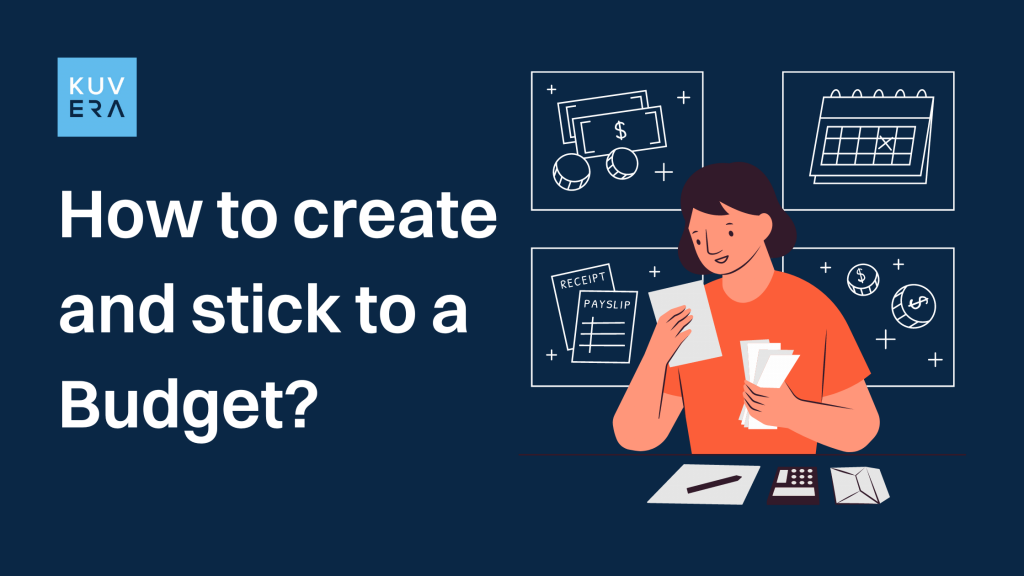Personal finance is the way of financing a life. In life, you spend and you save. But how and how much?
Budgeting is allocating where your income comes from and where it goes. The process begins with income and ends with investing. So do you know budgeting or simply save whatever is left of your income at the end of the month?
What is the purpose of Budgeting?
Budgeting can help you save money for investing. It’s the first step to wealth creation.
Imagine moving to a new city and getting your dream job. You are investing all your efforts into it. But you need help to stick to a budget. And your savings keep dipping each month because of crippling expenses. Here’s how you do it.
What is a Personal Budget, and how does it affect financial health?
A budget is a plan that helps you manage your income and expenses. It allows you to save money for different wants and needs. Basic expenses include food, housing, transportation and savings. By creating and sticking to a budget, you can control your spending, reduce debt and invest towards your financial goals. A well-managed budget provides you with a sense of security and peace of mind, knowing that you are in control of your finances.
How do I track my monthly expenses?
One way to find your monthly expenses is to list down the sources of income and expenses. Then, make specific categories and set a limit for each category. You can then use an expense tracking app, spreadsheet or just a notebook to record your expenses throughout the month. Once you have collected the data for a month, you can analyse it to see where your money is going. Then accordingly, you plan your financial goals.
What are financial goals?
You start by assessing your current financial situation and determining where you want to be in the future. Buying a home, saving for a vacation, paying off credit card debt, buying a vehicle, starting a business or planning for your retirement. All these are financial goals. Some are short-term, some are long-term. Hence, you must know how to differentiate between prior needs and later wants.
How do I prioritise my financial needs and wants?
Prioritising financial needs and wants can help you manage your money in a systematic way. You can start by listing all your financial goals. Then, you categorise your expenses into needs like housing and food, and wants like dining out and entertainment.
The 50/30/20 rule suggests you put 50% of your income towards needs, 30% towards wants and save the remaining 20%. You must also save for emergencies.
For wealth creation, your goal must be to save as much as you can, and invest that money. Spending leads to expenses, which give no monetary returns. However, saving leads to investing, which can give you monetary returns and help you achieve your financial goals.
What is the difference between saving and investing?
Saving is the process of setting aside money or other valuable assets for the future. It is a financial habit that can help you achieve financial goals.And the earlier you start saving, the more time it has to compound over time.
Investing is the process that takes your idle savings and uses them to buy businesses or securities. It not only helps your savings grow, but also uses the power of compounding to actually grow exponentially. With the time value of money, your investments turn into income-generating income by itself.
So how do I cut unnecessary expenses?
There are several ways to cut unnecessary expenses. The best way is to create a budget and track your spending to identify areas where you can cut back. You must avoid paying for subscriptions and memberships that you do not use regularly. You can also save money on groceries by meal planning and buying in bulk.
Additionally, you can look for ways to reduce energy and utility costs, such as using energy-efficient appliances and turning off lights and electronics when not in use. Finally, you can consider downsizing your living space or reducing your commute to save on housing and transportation costs.
How do I stick to a budget?
Sticking to a budget can be challenging, but not impossible. First, you must make a realistic budget and track your expenses to identify areas where you can cut back. You can use a budgeting app or spreadsheet to help you stay organised and on track. You should set specific and achievable financial goals, and prioritise them in your budget. You can even create a savings plan and set aside a portion of your income each month.
How does budgeting help in achieving financial goals?
Budgeting can help you achieve financial goals. By tracking income and expenditure, budgeting helps identify areas of overspending and makes you financially stable. So, with the help of planning and controlling your expenses, you can make sure that your expenses are within their limits and you can allocate more funds towards investing.
And, investing in an index fund can help you achieve your financial goals by providing market exposure to stocks.
Index funds track the performance of a specific market index, like the S&P 500. This is the reason why they have lower transaction fees.
Want to know more about Index Funds? Click here.
While, creating a budget involves knowing your income and expenses, setting spending limits and then tracking them, sticking to a budget requires discipline and consistency. Hence you must review and adjust your budget to make sure you are meeting all your goals.
Interested in how we think about the markets?
Read more: Zen And The Art Of Investing
Watch here: The Simple D.I.Y Investment Strategy for Beginner Investors
Start investing through a platform that brings goal planning and investing to your fingertips. Visit kuvera.in to discover Direct Plans and Fixed Deposits and start investing today.

